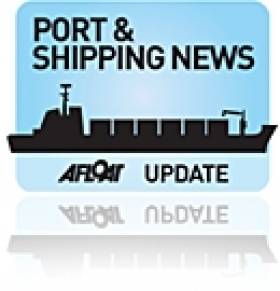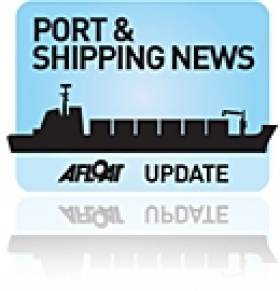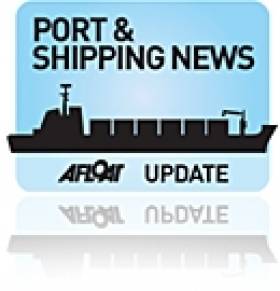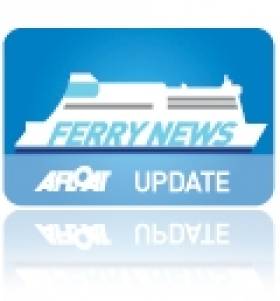Displaying items by tag: Port News
£81m Biomass Plant to be Built on Port Estate
#EnergyPort - Funding for a renewable energy plant costing £81m is to be built at Londonderry Harbour Commissioners lands at Lisahally.
Northern Ireland-based Evermore Renewable Energy will build the flagship biomass CHP plant, which is the first of its kind on the island of Ireland.
The 15-megawatt plant will increase the amount of renewable energy currently generated in Northern Ireland by approximately 10%. For more on this development U.TV news has a report.
EU Ports Framework Policy Conference in Brussels
#PORTS NEWS – A major two-day ports conference organised by the European Commission, started today in Brussels, where 400 delegates representing different stakeholders within the port sector are attending.
The aim of the conference is to analyse the current EU policy framework for ports, which is laid down in a communication of the Commission that was published in 2007. The outcome of the review is not decided yet, with options ranging between doing nothing, guidance on application of Treaty rules and full-blown legislation.
"We firmly believe that the European Union has the potential to be a positive force in establishing a renaissance of port management and policy", said European Sea Ports Organisation (ESPO) Chairman Victor Schoenmakers in his statement at the conference. "This can be done by, on the one hand, ensuring a level playing field and legal certainty, and, on the other hand, fostering growth and development of ports."
Raising the specific challenges of port authorities, Mr Schoenmakers highlighted access to port land as a principal point of attention. "The most important asset that port authorities have is land. The way we give access to that land to operators is therefore essential. Whether we do this through public domain concessions or private land lease contracts is irrelevant.
"What matters is the ability to balance transparency and flexibility when using these instruments. Having clear, but also proportional guidance on the application of relevant Treaty rules is for us therefore an essential element of a common ports policy, next to guidance on State aid and guidance on the freedom to provide services."
The ports policy conference will be followed by a further consultation on the options at hand and an impact assessment. The outcome of the process is expected for spring next year.
New Ship-Management Company Launched in Cork
#PORTS & SHIPPING NEWS – The Irish Maritime Development Office (IMDO) have welcomed a newly founded ship-management company, Barry Shipping, which started operations in Cork at the end of last year.
The company headed by Corkonian Owen Barry, provides ship management, crew management, project management, training and a range of other services for the maritime industry.
Glenn Murphy, director of the IMDO said "We wish Barry Shipping well with their new venture and look forward to providing them with further strategic and network support to assist them during their continued development".
Commenting on their future strategy Barry said, "The company's aim is to provide clients with creative and profitable solutions to meet and overcome some of the unique challenges in the current climate".
Barry graduated from Cork Institute of Technology (CIT) in 1996 and started his career with BP Shipping as an Engineering Cadet. This was followed by working with leading passenger operators Irish Ferries, P&O Cruises and Dobson Fleet Management where he served as Chief Engineer and Technical Superintendent. In 2009 he returned to Cork to run operations for Fastnet Line.
For more information about the new company, visit www.barryshipping.com
In addition for details about the role of the (IMDO) which is Ireland's national dedicated development, promotional and marketing agency for the shipping services sector click HERE
Celtic Link Ferries Look Forward to New Ferry
Celtic Link Ferries are to introduce a replacement ferry on their Rosslare-Cherbourg port route later this year, writes Jehan Ashmore.
The current ship serving the route to France is a modern 26,500 tonnes ro-pax ferry Norman Voyager which entered service for Celtic Link Ferries less than two years ago. The ferry (photo) has a service speed of 22.9 knots and takes 18-hours to travel on the direct route between Ireland and France.
A spokesperson for the company claimed that bookings for the thrice-weekly round-trip sailings for this season are faster in uptake compared to this time last year. The Norman Voyager can take 800-passengers and 200 vehicles and facilities include 110 cabins, bar, restaurant, lounges, cinema and a shop.
The charter of Norman Voyager ceases in October and this will see the introduction of the acquired vessel on the year-round operated service. A competition is to be run and open to the public so to establish a new name for the vessel.
The new vessel the Cartour Beta (photo) is slightly larger at 27,552 tonnes and will be able to offer facilities with a wider choice of bars, restaurents and play areas. She has a speed of 25 knots, an increased passenger capacity of nearly 1,000 passengers, 800 cars or 150 freight vehicles.
Cartour Beta in the meantime operates on an Italian ferry service run by Caronte and Tourist (C&T) on two routes between Salerno to Messina and Termini Imerese in Sicily.
Externally in appearance the vessels are very similar except that the Cartour Beta has a continues superstructure that extends to surround the funnel whereas on the Norman Voyager this area is occupied by an open upper vehicle deck.
In fact the replacement vessel is more alike to Stena Line Irish Sea Ferries Belfast-Birkenhead route-ship sisters Lagan Viking and Mersey Viking. Like the Norman Voyager all these vessels are derived from a popular series built by Visentini, an Italian shipyard in Donada near Venice.
Since Celtic Link Ferries took over the route from P&O Irish Sea in 2005, the company has kept to a keenly priced policy with competition from other operators on the continental routes that also run out of Rosslare Harbour and from Cork.



























































